- Home
- Gregory Maguire
What-The-Dickens: The Story of a Rogue Tooth Fairy Page 3
What-The-Dickens: The Story of a Rogue Tooth Fairy Read online
Page 3
I’d better face facts, thought What-the-Dickens. I think I’m in love with a cat. Well, I’ll just keep it to myself.
He couldn’t wait a moment longer. “Coming!” he shouted, and he tore a broad leaf off at the stem. Gripping its rim as a child grips a toboggan, he launched himself into the air.
It was a foolhardy gesture. So young, he knew nothing about aerodynamics, except how the heart could lift and lift.
Did he plummet to his death? No, he surfed the breeze. He was light enough not to drop like a stone. The leaf circled without overturning, and the skibberee peered over the sides.
He was startled by what he saw. Remember, he was only one day old himself, and he’d seen little of the world so far, and all of it from close-up. This was his first sense of the larger landscape.
How marvelously the world seemed to unfold, improbably, in all directions — forest this way, field that! A grey ribbon looping over the hills to the north (in time What-the-Dickens would learn it was a highway). Off in the distance to the west, a lowland bog choked with purple loosestrife. It was as complete a world as What-the-Dickens had hoped for. And a river ran through it.
But before he could glide into McCavity’s waiting claws, he was plucked from his vessel by the mama grisset. She dumped him back in the nest with the other nestlings, scolding What-the-Dickens as if he were one of her own.
She sat on him to make him be quiet. He pounded his little fists against her feathery rear end, while McCavity began to make her way up the trunk of the tree.
No big surprise, then, that the mama grisset suffered an attack of nervous conniptions. Her melody lost track of itself and became a shriek. When McCavity was only six or eight feet away, the mama grisset began to thrash her wings, to screen her children and to blind the intruder. In the commotion, she knocked one of her own nestling babies out of the tree.
What-the-Dickens lunged to grab the baby grisset’s tail. He was too late, and grabbed only air.
But the smallest grisset did something wonderful. First she tumbled, and then she opened up her little wings. Clumsily she coasted a few feet and came to rest on a limb in an adjacent tree, looking surprised at herself, and a little smug.
“I didn’t know you little ones could fly, too,” whispered What-the-Dickens. “Wow.”
The white cat continued to climb, so the mama grisset took emergency measures. If her littlest nestling was ready, the rest would have to be ready, too. Without ado she launched the other three grisset siblings. One by one they wobbled to new perches, and, delighted with themselves, they all began to sing. (Given their family background, they stank at singing. But you can’t learn everything you need to on the same day, not even if you’re stuffed with talent.)
The mama grisset was as much a mama as she was a grisset, so she couldn’t abandon What-the-Dickens to his fate, about which she had a better idea than he did. She took him in her beak one final time. This at least had the advantage of silencing her concerto.
“No!” cried What-the-Dickens. He struggled and began to weep. “No, no! My ride is almost here. My friend looks for me. How dare you? Unbeak me, and I’ll bring you a present the next time. . . .”
The offer didn’t help. The rust-throated grisset had made up her mind. She left by wing, dragging What-the-Dickens beneath her.
He closed his eyes against the wind, but he felt also as if he were closing them against the world, which now seemed to be full of emptiness. What good was the future if he didn’t have a job as a pet to a minor deity in a white fur coat?
By now the night had fallen, with a quality of blackness rarely seen in a suburban setting. It made the house feel crushed into itself, as if it were floating in space, separated from anything. Well, given the backed-up sewage lines, the dead phones, the collapse of the power grid, the Ormsbys were separated from everything.
Everything except themselves. While Gage went to refill his glass of water — to keep his busy voice from drying out — Dinah looked inquiringly at Zeke. What-the-Dickens? said her expression.
He rolled his eyes, indicating, Stupid nonsense, but probably harmless.
Dinah stuck her tongue out at her brother, signifying, Don’t be so superior.
The usual conflict, and, in its way, consoling. They still had each other. That much was okay.
The orphan skibberee was dizzy and lost. What a mess I’ve made of my life so far, he thought. But where did I go wrong?
He watched the feathery breast of his captor heave as the mama grisset flew on. He knew that she meant well. Sadly, her navigational skills were on a par with her singing talents. (Dismal.) True, she could manage to migrate south each autumn, and to make it back home again the following spring. But this was because she was usually accompanied by ten thousand other migrating grissets. When left to her own devices, she was hopeless. She repeated herself in circles.
Around and around the grisset swooped, over the cloverleaf, the scraps of woods, the abandoned millworks, the glittering string of river. Ten years ago, there weren’t as many fast-food outfits in the outback of dairy country — remember, this is my childhood I’m describing. Sure, a few parking lots, the first of the strip malls converting patches of upstate farming community into suburbia — but not many. Instead, just weary old farms, outliving their usefulness. Village centers arranged a century earlier around the junction of railroad lines. Schools, of course, and playgrounds: there have always been schools and playgrounds.
But the biggest difference was the amount of undeveloped land. Hills weren’t colonized: they were too hilly. Bluffs were left alone. No one wanted to build McMansions on the wetlands yet. There was more that was still wild back then, even in a settled district. We didn’t crowd the world so much with ourselves.
The skibberee felt airsick. He thought they were flying a thousand miles. Every time they passed over the new county zoo, which had been erected not far from where one highway crossed another in a snarl of curving ramps, he thought it was another zoo. He could smell the warm stink of animal ordure, which he didn’t mind, and hear the trumpeting of elephants, which he couldn’t identify. “My, this world is huge, and full of noisy, windy creatures,” he guessed. He was right about that, but for the wrong reasons.
The mama grisset didn’t set out to abandon her passenger. She only wanted him to live long and prosper. She meant well when she decided to set him down on the lip of a jaunty old chimneystack three stories above the ground. She supposed that he could rest there and then fly away when he was ready. She thought the filmy webbing bunched up at his shoulder blades was a pair of wings.
But her aim was poor, and she dropped the poor skibberee right down the chimney.
I’m cooked, thought What-the-Dickens, tumbling into the dark. I’m yesterday’s news. How brief is life, how brief! As he fell, he could hear the beginning of the mama grisset’s song, now that her beak was available for use again. It sounded, as usual, dreadful, but because it was now familiar, he regretted how it faded away.
The webbing attached to his shoulder blades opened, slowing his plunge the way a parachute might. He slid down a side flue into a small fireplace on the third floor of the big old house.
Since it was midmorning, last night’s fire had long since died out. The skibberee flumped into a mound of warm, soft ashes. A cloud of grey dust erupted as he landed, coating him at once.
Now, one thing about skibbereen that you’ll appreciate: they are as finicky in their habits of personal hygiene as cats are. They have to be, for camouflage is their only protection. Any skibberee who is dusted with, oh, wheat flour or soot, say, shows up the color of flour or soot, every little limb and lock. Visible to the naked eye.
What-the-Dickens hated the feeling. He wanted to bathe at once. He sneezed, issuing a little crumpled fold of a sound.
“What’s that?” said a voice. A croaky human voice.
He froze.
“Is that a bird fallen down the chimney?” said the voice. “When a bird comes into a hous
e, there’s going to be a death in the family. And I know whose it is. Mine. I’m ninety-nine years old. If I could get out of bed, I’d come over there and find you, pretty little birdie, and I’d wring your pretty little neck. I’m not going to the Great Beyond till I’m ready, and I haven’t seen the morning papers yet. That fool of a grandson hasn’t brought me my funny pages.”
What-the-Dickens had the sense that the old crackly voice wasn’t really talking to him. He watched a gnarled hand emerge from some bedclothes and reach for a gnarled cane. The cane bent as it took the weight of an arm. Eventually a head emerged around the headboard.
The ancient creature peered into the fireplace.
“Can’t see a cursed thing,” complained the old biddy. “Left my glasses on the mantelpiece. Boy, why are you crying? Hee-hee. Get out of here, little birdie of death, before I fricassee you for lunch.”
What-the-Dickens froze. If he didn’t move, perhaps he wouldn’t be seen.
The old woman wore a nightcap that puffed up like a white brioche. Her sweatshirt declared, MY GRANDSON WENT TO BUSCH GARDENS AND ALL I GOT WAS THIS LOUSY SWEATSHIRT.
Guess that wasn’t the right present, thought What-the-Dickens.
Since she’d already given to history most of her teeth, her mouth was sunken into puckers. Her face was so pleated, thought What-the-Dickens, that if you could stretch her skin until all the wrinkles were flattened out, her head would be about three feet in diameter.
A stack of books tied in a length of twine was tipped onto the floor beside her bed.
“My loved ones forget about me,” she grumbled. “Birds fly into my chimney, death squats on my counterpane, and no one even brings me the newspaper. Who likes to be so alone?”
What-the-Dickens thought, I better get out of here.
Slowly he backed up. Every footfall raised a small cloud of dust, cloaking him further. He sneezed again once or twice, but the old woman seemed already to have forgotten about him.
Little by little What-the-Dickens found himself foot-shelves and handholds in the spaces between the bricks lining the hearth. It wasn’t hard to make his way up the flue. Every now and then he’d dislodge a clump of crumbling mortar, but in no time at all he was safely out of sight.
He came to a ledge in the chimney wall, formed where a flue from a different fireplace joined the one he’d fallen into. Here he rested a while.
I don’t want to be alone, either, he thought. But I don’t want to be her pet. I want to be McCavity’s pet.
From far below bubbled the ordinary household noises: a washing machine on the rinse cycle, a radio scratchily chortling news of the tennis championships at Wimbledon. But since the skibberee could identify none of it, the house sounded full of danger.
Finally the snoring of the old woman — nap time for Granny Menace or whatever her name might turn out to be — lulled the skibberee to sleep too. He dozed all day. By the time he woke up, the blue square of sky at the top of the chimneystack had gone black, and was punctuated with stars.
The world seemed no safer than before, but thanks to the soot, at least he was camouflaged. The appropriate dress for night was clinging to his limbs.
He summoned what courage he could muster and he continued his climb. His stomach rumbled, but not loudly enough to wake up the snoring old woman.
He would find McCavity yet. And find the right present to win her affection. He would not remain alone.
It was good to have a quest.
Rebecca Ruth sighed and rolled over. She was so busy chewing on her lamb that his nose was damp. “Tiger,” she muttered in her sleep. “Tiger.”
Dinah’s leg had fallen asleep, but not the rest of her. She stretched out her calf, which became pestered with tingling. “Ooooh,” she groaned softly, and the sound of her own fussing made her remember the fullness of their real troubles.
Hoping her voice wouldn’t tremble, she said, “Knowing how hungry the skibberee is makes me hungry.” Gingerly she got up and hobbled to the table. She was careful to spoon out only her fair share of the peaches, lying glossily in their slick of syrup. “By the way, where is all this taking place?”
“Long ago,” said Gage, rejecting her offer of tuna or peach.
“I know that. You’ve promised you’re coming into the story, and the world sounds so old-fashioned that you probably had training wheels on your two-wheeler. But I didn’t ask when; I asked where. Is it around here?”
Gage rubbed his eyes.
“It was not only a decade ago,” he said at last. “It was also far away. A place miles and miles upstate. A place of my childhood.”
Her face fell. Gage could tell that he’d given her a disappointing answer. Dinah wanted this story local. “Can we ever go there?” she asked.
“You can’t ever go back to your childhood haunts,” he said, too tired to keep from sounding teacherly.
“I’m still a child,” she pointed out. “I could go there. What’s it called?”
He smiled, though the candle guttered just then and the smile, to Dinah, looked a bit like a wince. “Fern Hill,” he said at last. “It was my tenth year to heaven.”
“My same age,” said Dinah.
Zeke twitched in his blankets. Dinah couldn’t tell if he was pretending to listen to the story, or pretending not to listen. He seemed to be taking a dim view of this story; maybe he thought he had to, with their parents gone. He was still awake, though.
What-the-Dickens had never seen the night sky before. It was so vast, so salted with stars, he got a headache. Dizzy with gaping at it, he lost his footing and slid down the roof, ending up in a rain gutter.
Sitting up to his waist in the muck left by yesterday’s hurricane, he rubbed gritwater out of his eyes. I’m in an aqueduct of swamp, he thought, and there — look — oh, gosh — what is it —
A shooting star stitched a broken line of light across the velvet black. It was gone before he could speak or point — but what a jab of surprise it supplied.
He didn’t know enough to say, “Star light, star bright, first star I see tonight: I wish I may, I wish I might, have the wish I wish tonight.”
Instead, he reached his hands up as if, by force of devotion, he could will the brilliance to come back.
But the shooting star didn’t return. It was oblivious to the attention of an orphan skibberee. So What-the-Dickens stood up, shook himself, and began to make his way along the gutter. Rounding the edge of a gable, he squinted through a window. Inside, he saw another glow: a plain ivory-colored night-light in a socket.
“It looks like a nice warm little tooth there, biting the dark,” thought the skibberee. “That would make a nice present.” He tried to see who was in the bed. He could make out cowboy motifs on the headboard, but he couldn’t identify the lump under the covers. He only knew it wasn’t old Granny Menace upstairs.
The window was closed to him. The sleeper didn’t know or care about him. Keep going, he said to himself. You can’t catch the attention of a star; you can’t wake a sleeper for company. Just keep McCavity in your heart, and find her. Offer her your allegiance. That’s your job.
At the far end of the gutter, he lost his balance. Before he could panic, his shoulder webs flared out like extra arms, stabilizing him. Whoa! With a little practice he found that by rotating his shoulder blades, he could stretch the webbing so it billowed like parachute silk, or relax it back into folds. Cool!
I’ll show this new skill to McCavity. She’ll hire me as her pet, for sure. If nothing else, my present could be to sit on her brow and keep the sun out of her sultry eyes.
What-the-Dickens took his time climbing down the side of the old house. The building had been painted ivory at some point, though now it was aging into a kind of silvery, sea-drift color. This is only important to mention because later he would need to find his way back here, and then he would be glad he had noticed a few details.
The prospect was pleasant enough. The house stood on a little rise. Several jalopies were ab
andoned on the back lawn, apparently being gutted for spare parts. Sheets that no amount of washing would ever get quite white again hung and flapped on clotheslines in the dark.
The world at night smells richer than it does during the day — at least for the skibbereen. They have capable noses. What-the-Dickens followed his nose and zigzagged about. McCavity, McCavity. Not anywhere near here, by the sniff of it.
He was beginning to feel practiced at things. When a field mouse darted by with a sly sideways smile, the skibberee grinned back. I bet mice know where cats live, he thought. Maybe I can ask for directions.
He gave chase to the little brown creature, but he couldn’t catch up fast enough to ask the question — which was lucky, for suddenly a black curse of shadow fell upon the mouse. An instant later, the squeaking mouse was airborne, clutched in the talons of an owl.
So What-the-Dickens became more wary.
He took his time and kept as hidden as he could, darting from the shadow of a trash bin to the lee of a telephone pole to the safety underneath a US mailbox. Once, by accident, he took a lift on a child’s abandoned roller skate. Faster and faster it rollicked him downhill until it dumped him at a big stone gate with a sign above that read ZOO.
A curb here, a streetlight there. A gravel parking lot here, a stone wall there. What-the-Dickens tried to stay inconspicuous, but here was a piece of popcorn — yum! — and another one there, and another one beyond that. So he was learning about mealtime at last, thanks to a shuttered refreshment kiosk. The remains of spilled snacks glistened in the lamplight like edible jewels.
Caramelized peanuts. A half-melted gumdrop. Sorry, I won’t talk about food anymore.
It was all pretty stale. But What-the-Dickens ate with gusto. Then he pushed beyond the snack stand. He felt braver and stronger. McCavity, he thought. Am I on her trail? I can sense something.
The popcorn led past the Elephant Palace, past the Monkey Pagoda, past the netted domes of the Tropical Bird Sanctuary, and right up to the Cat House.

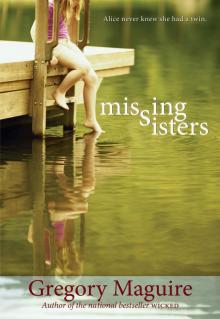 Missing Sisters
Missing Sisters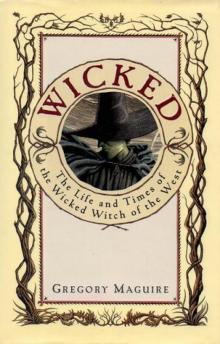 Wicked: The Life and Times of the Wicked Witch of the West
Wicked: The Life and Times of the Wicked Witch of the West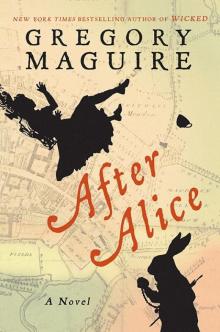 After Alice
After Alice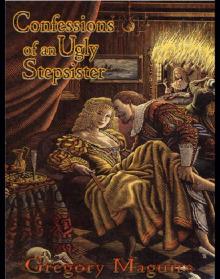 Confessions of an Ugly Stepsister
Confessions of an Ugly Stepsister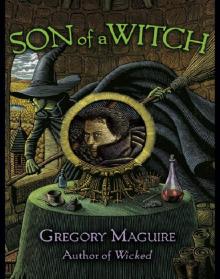 Son of a Witch
Son of a Witch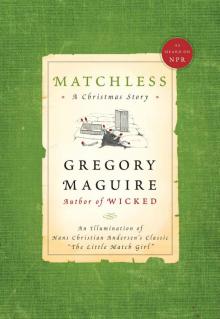 Matchless
Matchless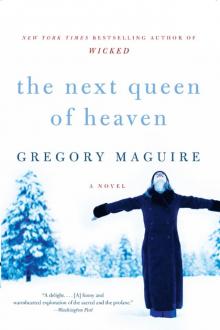 The Next Queen of Heaven
The Next Queen of Heaven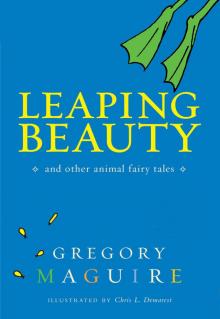 Leaping Beauty: And Other Animal Fairy Tales
Leaping Beauty: And Other Animal Fairy Tales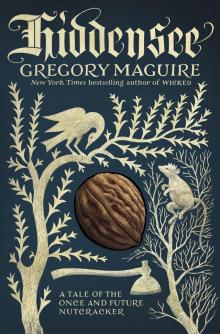 Hiddensee: A Tale of the Once and Future Nutcracker
Hiddensee: A Tale of the Once and Future Nutcracker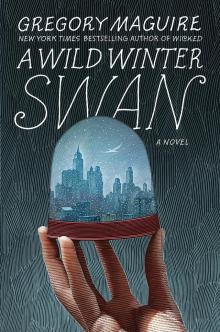 A Wild Winter Swan
A Wild Winter Swan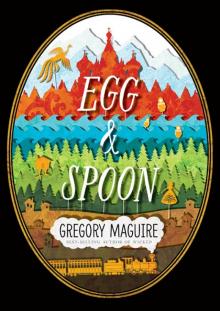 Egg & Spoon
Egg & Spoon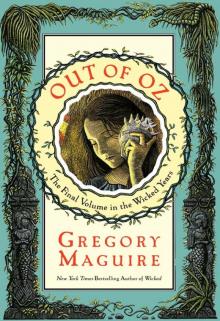 Out of Oz
Out of Oz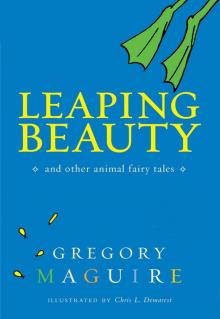 Leaping Beauty
Leaping Beauty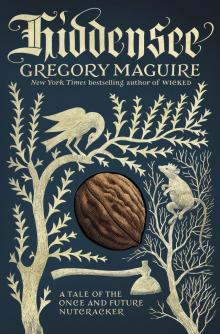 Hiddensee
Hiddensee The Wicked Years Complete Collection
The Wicked Years Complete Collection The Next Queen of Heaven: A Novel
The Next Queen of Heaven: A Novel